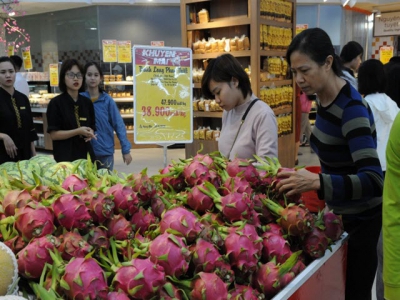Organic farmers reap fruit of investment due to growing demand

The growing demand for organic farm produce is generating huge potential for organic agricultural development. Provinces in the Mekong Delta in particular and Vietnam in general have encouraged enterprises, farmers and cooperatives to invest in organic agricultural production.
The increasing demand for clean, quality and safe food is offering opportunities for organic agriculture development
Organic food development opportunities
The growing market share of organic products in the world is a great opportunity for agricultural producers to shift from conventional to organic agriculture. Besides being safe for human health and the environment, organic farming can also increase farmers’ income due to the higher price of organic products compared to ordinary agricultural products.
The United Nations estimates that the world population will increase to 9.2 billion by 2050, doubling food demand and considerably increasing demand for clean, high quality and safe food.
According to Associate Professor, Dr. Le Van Vang, Head of the College of Agriculture at Can Tho University, the productivity of organic agriculture is about 20 percent lower but yields a profit up to 47 percent higher than conventional farming. Provinces in the Mekong Delta are particularly well suited for organic agricultural development, he added.
Many enterprises in Vietnam are involved in organic agricultural production. Vinamit CEO Nguyen Lam Vien said 65 percent of his company’s products are exported to Japan, China, Malaysia, European countries, and North America. Vietnam can become the kitchen of the world. The number of visitors to Vietnam is expected to double once the Covid-19 pandemic is controlled, and the Vietnamese cuisine’s reputation for natural, healthy ingredients will provide further opportunity to develop organic food for the domestic and export markets, he said. In general, 2020 is the year of organic farming in Vietnam because the Covid-19 pandemic has boosted demand for healthy products.
Pham Thai Binh, CEO of the Trung An Hi-Tech Farming Joint Stock Company in the Mekong Delta city of Can Tho, decided to expand his company’s organic farm 15-fold to 1,500ha this year after seeing a surge in demand. The company’s existing 700ha of organic rice is supervised and certified by ECOCERT. The company’s organic rice products have been highly rated in terms of nutrition, fragrance, and taste that suits the majority of consumers in both domestic and foreign markets. They have been exported to the US, Japan and Europe, Binh said.
Other companies are also optimistic about organic product export potential, especially with the EU-Vietnam Free Trade Agreement coming into effect recently.
Nguyen Ngoc Huong, founder of Thien Nhien Viet, a producer of organic vegetable powder, said European buyers love organic products and they buy everything her company sells.
But industry insiders say the organic farming industry in Vietnam still has a long way to go and companies need to invest more in perfecting their business model.
According to agricultural experts, organic agricultural production in the Mekong Delta in particular and Vietnam in general is facing challenges, including intensive chemical fertilizer practices, changing produce prices, climate change, and land and irrigation water quality.
Practical, consistent solutions needed
Associate Professor, Dr. Le Van Vang said provinces and cities can promote organic farming in urban areas to ensure land and irrigation water quality, and indoor farming makes it easy for farmers to apply biological protection measures. Application of high technology is vital to create an optimal environment for farming, and minimize pest pressure and the use of chemical fertilizers while ensuring crop growth.
Not only technology but also practical, consistent policies are important for the development of organic agriculture. The government should adopt preferential land, credit and tax policies for organic farms, cooperatives and enterprises. Localities need to clarify specifications and competitive advantages of specific regions and products in order to formulate appropriate development strategies, and they need to step by step build production value chains and add value to organic agricultural products. Training, trade promotion and supply-demand connectivity are also key for organic agriculture development.
According to the Ministry of Agriculture and Rural Development, the agricultural sector’s organic farming area increased from 53,350ha in 2016 to 237,693ha in 2019; 46 of the 63 provinces/cities nationwide are engaged in organic agricultural production; 17,168 farmers and 97 businesses are involved in organic agricultural production; and 60 enterprises export organic produce worth a total of US$335 million per year. Vietnamese organic farm produce is sold domestically and exported to 180 countries and territories worldwide, including the US, the EU, China, Japan, Germany, the UK, the Republic of Korea (RoK), Russia, Singapore, France, Belgium, the Netherlands, and Italy, among others, according to a survey published in 2020 by the International Federation of Organic Agriculture Movements (IFOAM).
The Prime Minister issued Decision 885/QD-TTg dated June 23, 2020, approving a project for organic agriculture development in 2020-2030. The project aims to restructure the agricultural sector by increasing the sector’s added value and improving the position of Vietnamese agricultural products in foreign markets.
Có thể bạn quan tâm
 Mekong Delta district to grow only high-quality rice, targets exports
Mekong Delta district to grow only high-quality rice, targets exports Authorities in Tiền Giang Province’s Gò Công Tây District are encouraging farmers to grow only high-quality rice varieties and want to export all of it.
 Rice exporters have bumper year, VN becomes No 1 in the world
Rice exporters have bumper year, VN becomes No 1 in the world The year 2020 has been a challenging year for many business fields, but not for rice production and exports. Vietnam has surpassed India and Thailand
 More efforts needed to attract FDI into hi-tech farming
More efforts needed to attract FDI into hi-tech farming The Vietnamese government holds high hope for a green and safe agricultural sector that could be a driving force for growth just like the manufacturing